Cover Feature: Black Coffee
The African artist making a global impression on house music
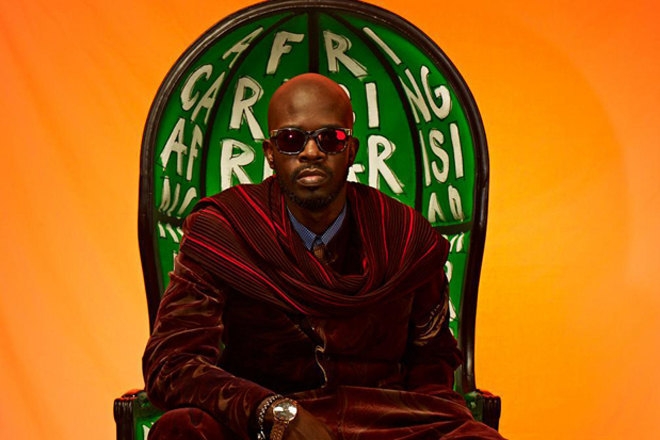
If you didn’t already know that Nkosinathi Innocent Maphumulo – better known as Black Coffee, or simply Nathi – is a superstar in his native South Africa, you probably wouldn’t guess it. Slouching on a leather sofa in a Berlin hotel lobby, his tall, lean frame is dressed fashionably but modestly (designer jeans, trim denim jacket, hipster scarf) and his friendly, if slightly reserved, demeanour doesn’t exactly scream ‘household name’.
To be fair, he’s pretty knackered too. It’s midnight and he just flew into the city today after a couple of weeks of globe-trotting gigs in Lisbon, Toronto, London and France. In a couple of hours he’s set to wow the crowds at Berlin’s Watergate before flying out a few hours later to play the opening of Ibiza’s Circoloco, alongside the likes of Kerri Chandler and Cassy. Then it’s on to more gigs in Amsterdam, Barcelona, New York, with occasional returns to SA to record his new album.
All of which is impressive for someone born into relative poverty in a township (Umlazi) near Durban and raised – mostly by his mother and grandmother – in a rural part of Mthatha in the Eastern Cape. Nathi’s humble origins are just one of the fascinating aspects of his career, and listening to him share his childhood stories of hardship and ambition instils a real sense of respect.
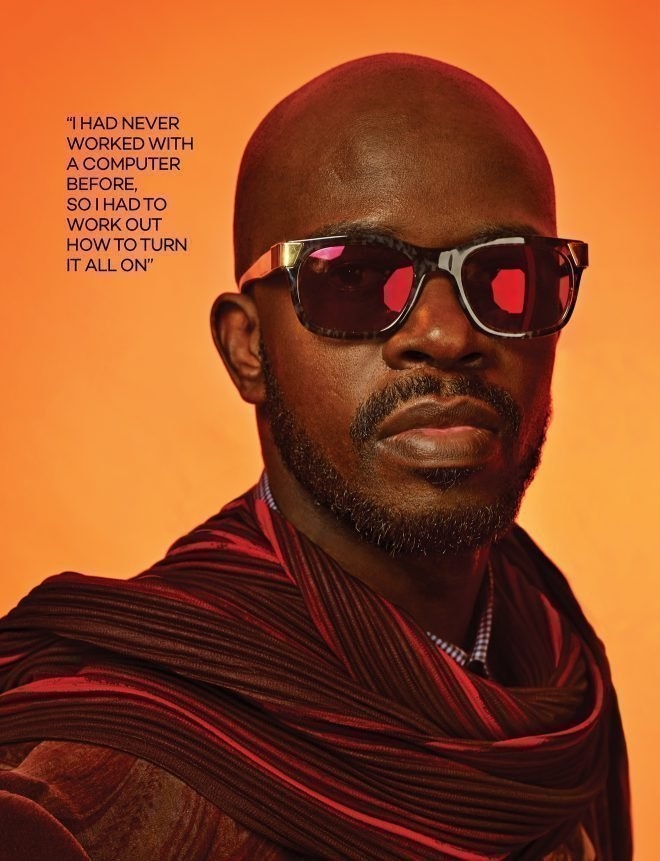
“I knew I wanted to be an international DJ from a very early age,” he says in his quiet, steady voice. “And even before that it was always my dream to be recognised worldwide, even if I wasn’t quite sure how. My life at that time was very removed from the reality of this idea of course, but that was the conversation I used to have privately with myself, and with God.”
In a recent Origins documentary produced by Resident Advisor, director Patrick Nation and his film crew followed Nathi back to Umlazi – “Section E” – where he spent his early years, and where his mother, Faith Dandala, still lives. In the doc, she talks about how Nathi was always fascinated by music and would ask for “things that made a noise” instead of guns or other toys. “I always loved music and have been through many different musical phases over the years,” he tells us. “My uncle had a big reggae collection and would play me Peter Tosh and Bunny Wailer, which even today takes me straight back to my childhood and that house in Umlazi.
“He played us new music too. He would play it on his ghetto blaster and we would all gather outside in the street and listen and dance.”
When Nathi moved to Mthatha in 1988 he met another guy who collected music – “mostly South African disco and pop. This was in the days of cassettes, and every time he had a new one he would come and get me to dance. That was his test; if I liked the music and danced to it he would say it must be good.”
While growing up in the quiet surroundings of Mthatha, Nathi would balance the rural reality of milking the farm’s cows every morning before school with Big City dreams of becoming a DJ. At night he would sit down and draw his “dream room”, which consisted of a pair of 1200s and a mixer, and fantasise about being friends with the “world’s greatest superstars”. Getting out of the oppressive township system, which was set up to keep black South Africans away from the cities, increasingly became a priority.
When his school introduced a music class he was first in line, getting involved in choirs and acapella groups (he sang baritone). On February 11 1990, the day Nelson Mandela was released from prison, Nathi was celebrating outside with his community when tragedy struck in the shape of a speeding minivan that ploughed into the crowd. One person was killed instantly, and several were injured, including Nathi, who lost the use of his left arm; it’s still damaged today, which is why he keeps his left hand in his jeans pocket.
Undeterred, Nathi continued developing his passion for music alongside a parallel interest in art and illustration. When he finished high school he was torn between studying fine art in Jo’burg or music in Durban. His mum helped him fill in forms for several courses, and he was eventually accepted into the music school where he studied jazz with a major in voice.
“It’s funny,” he smiles, scratching at his beard, “a few months after I was accepted I was looking in some drawers at home and found the forms for the other schools. I guess my mum never submitted them as she was worried about how I would survive alone in a city like Jo’burg. But Durban was a great course. I learned everything from film scoring to jingle writing there, and even though I was just nineteen, I got to direct my own band.”
Along with fellow music students Mnqobi Mdabe and Thandukwazi Demor Sikhosana, Nathi formed his first band, SHANA – Simply Hot And Naturally African – an outfit that blended electronic grooves with r’n’b and traditional African sounds. Nathi’s official role in the band was DJ and occasional songwriter, but it was his resourcefulness that proved even more influential.
Frustrated by the rule that students at the music school weren’t allowed to use the in-house studio for two years, he managed to copy the key one day and snuck in with his bandmates at weekends to rehearse and record songs. “I remember the first day I got in,” he grins. “It was 7am and I can still recall the smell of the studio very clearly. I had never worked with a computer before so I had to work out how to turn it all on, then how to load up the programs…” The school must have known what was going on, he says, but turned a blind eye. By the time the first year was over, the senior music lecturer would call Nathi if there was a problem in the studio; he had become the unofficial technician.
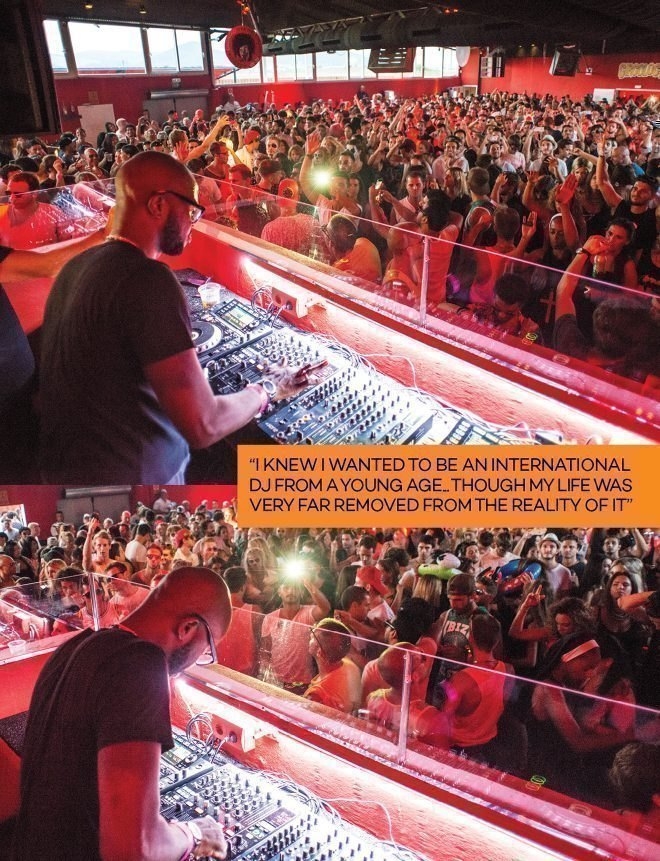
A short while after, SHANA became the first band from the school to land a record deal (with Melt 2000 in the UK) and were a regular highlight on the local gig circuit. “That band was my real university,” says Nathi. “We made so many mistakes musically and in our approach, and we were so loyal to our sound that it actually kept us in one place. When I went solo the first thing I did was to remix one of our songs in a direction I had always wanted to take it but couldn’t.”
Nathi’s fascination with electronic and dance music continued to grow, and by the late 90s he was DJing independently of the group, spinning mostly slow, soulful dance music like Soul 2 Soul, Mariah Carey, Black Box’s ‘Fantasy’, Banderas ‘This Is Your Life’ as well as home-grown takes on house music like Kwaito and Midtempo. The record that finally pushed Nathi towards house was the one that changed the game across the whole of South Africa: ‘Fresh House Flava Vol 1’.
This 1998 compilation, released by Jo’burg label House Afrika, featured a host of soulful house belters like Crustation ‘Flame’ (Mood II Swing vocal mix), Presence ‘Better Day’ (Bookworm dub mix), Abstract Truth ‘We Had A Thing’ (Matty’s Body & Soul mix) and Shena’s ‘Let The Beat Hit ‘Em’, almost all of which became huge hits and are still regarded as classics throughout SA today.
The DJ behind the compilation, DJ Fresh (originally from Botswana) was, alongside Oskido and Glen Lewis, a big inspiration for Nathi. “These were the guys I looked up to and wanted to be like,” he says. “But at the same time I wanted to create my own songs, too.” In 2001 Nathi moved to Pretoria where he worked on making connections and picking up DJ gigs. In 2003 he made a successful application for the Red Bull Music Academy, where he says his “international ear was carved… I met people from all over the world who exposed me to different music styles, things like broken beat, and I started to do remixes and bootlegs.”
During the Academy Nathi was asked by a South African TV station where he thought he would be in three years. He replied that he wasn’t sure about three years… but in five years he would be one of the most important producers in South Africa. “After I said that my heart was beating so hard!” he says, chuckling at the memory. “I felt so stupid. It sounded very arrogant and that was not my style at all. Two weeks later I saw it aired on TV and I was really cringing. But I realise now that saying it also liberated me in a way.”
In the end, it took him only two years to make his mark nationally. His first big break, facilitated by Oskido, came in the shape of his “spiritual house” stonker ‘Happiness’ getting featured on the 2005 House Afrika compilation ‘DJs At Work’. The same year he followed up with another hit, a reworking of ‘Stimela’ by South African music legend Hugh Masekela.
“I was actually in the studio when the song came on the TV,” he remembers. “I immediately opened a new project and started programming. By the time it ended I had a skeleton of a remix, which I then worked on for two days straight and started to DJ as an instrumental. When people asked what it was, I told them it was going to be a remix. Eventually I was granted the rights and it worked out. Hugh even agreed to shoot a music video with me later on, which was a very big deal for me.”
Both ‘Happiness’ and ‘Stimela’ made it onto Nathi’s eponymous ‘Black Coffee’ album, a collection of released and unreleased tracks that came out towards the end of 2005 on his own Soulistic Music imprint. A follow-up album, ‘Have Another One’, came in 2007, and his third offering, ‘Home Brewed’, in 2009. For these recordings Nathi worked with a stellar line-up of South African vocalists – Bucie, Siphokhazi, Ringo Madlingozi, the late Busi Mhlongo – honing his signature deep house sound and building a cult following in the process.
In 2010 he scooped two SAMAs [South African Music Awards]; in 2011 he was nominated in the 2011 MTV Europe Africa, India and Middle East Category for Worldwide Act and launched Africa Rising, a live show featuring a plethora of vocalists, live musicians and a 24-piece orchestra, which played to a sold-out crowd at Durban’s Moses Mabhida stadium. “Africa Rising was and still is the best work we’ve done,” he says. “To see it grow from an idea to playing in front of all of those people was so heartwarming.”
To watch the show online is to experience a side of Black Coffee that we don’t yet know here in Europe. Here he is regarded more as an underground house DJ, but at home he is South Africa’s biggest DJ, a commercially-minded producer turned national icon, a man who can fill stadiums with orchestras playing house music and – as witnessed on the Origins documentary – send kids into raptures when visiting his former high school to give an inspirational talk.
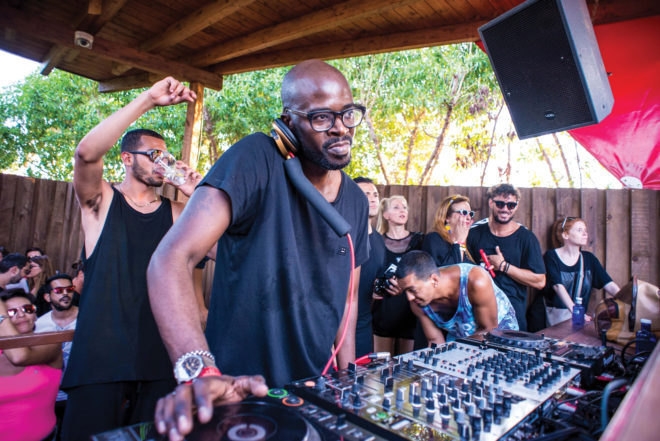
But his star has been steadily rising here, too. Last week was his second Circoloco opening party in a row, and the first time, he says, when he got the feeling that there were people there specifically to see him. That’s certainly a good sign, as are the increasing numbers of offers he’s getting from European and US DJs and producers who want to work with him, including Sven Väth, Loco Dice, Seth Troxler. “I consider myself an artist in two different ways and I try not to mix the two,” he says. “As a producer I want to do my own thing and be content with that. As a DJ, it’s different.
“I’m not crazy about producing music to play in clubs; I’m more about making music to consume either at home or driving to work. It’s never club music for me. So when I DJ it’s another world for me; they’re separate but parallel. In the past two years I have learned so much and met DJs I didn’t even know existed.”
At Watergate, after our interview, he plays to a packed house below the venue’s futuristic LED ceiling, mixing up a mellifluous set of expertly blended tunes like DJ Angelo & Foremost Poets’ drum-heavy ‘100 Years’ and the funk-tastic Manoo remix of Diephuis ‘Crossing Borders’ with exclusives from back home; tracks by Jo’burg’s DrumeticBoyz and Rudo Deep’s crisp shrugger ‘The Announcement’.
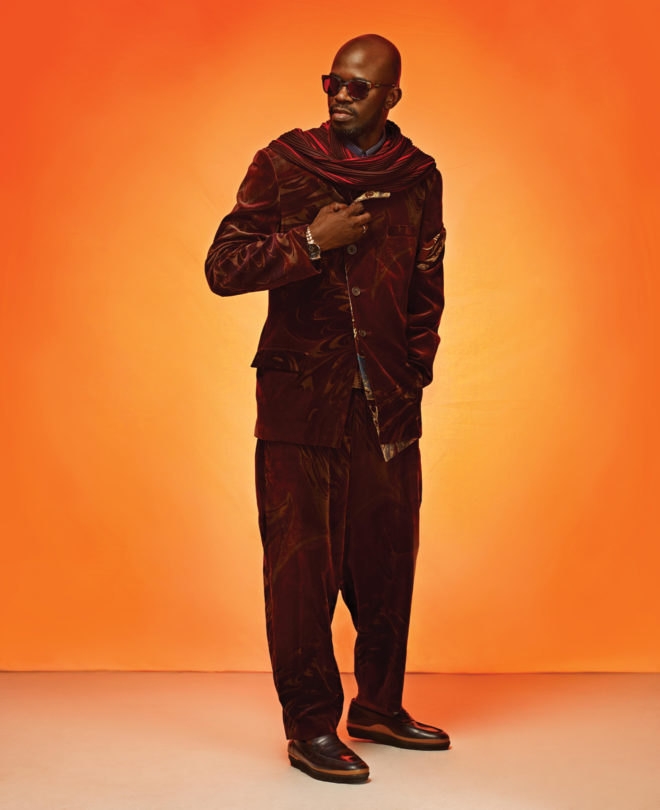
As ever, he looks calm and focused behind the turntables, his broad smile all the more infectious when he flashes it occasionally at the crowd. “It’s funny,” he says after the show. “I have this big career in South Africa, ten years of recording and playing, and a two-hour DVD of a stadium show that involves a 24-piece orchestra. But in many ways it’s like I am just starting, like I’m still just at the beginning.”
One question remains: what has motivated him all these years? “You know, living in the rural areas and the city has been a blessing in the way they have helped me understand and respect all kinds of people. I drive on the freeway in South Africa and see these guys in their work vans, and think to myself: I have been that guy. But nowadays I’m driving home from playing a gig where I make a month’s salary in an hour, and that pushes me. That’s what drives me. The struggling people are the ones who inspire me, the ones who have nothing.” Black Coffee is a different kind of superstar .


